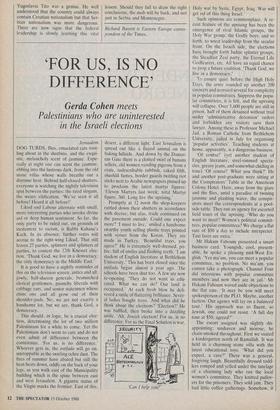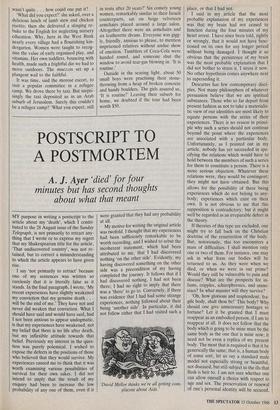'FOR US, IS NO DIFFERENCE'
Gerda Cohen meets
Palestinians who are uninterested in the Israeli elections
Jerusalem DOG TURDS, flies, emaciated cats root- ling about in the dustbins, and the exqui- site, melancholy scent of jasmine. Espe- cially at night one can scent the jasmine, ebbing into the lustrous dark, from the old stone villas whose walls breathe out a daytime heat. Behind half-closed shutters, everyone is watching the nightly television spat between the parties: the tired slogans, the weary vilification. 'We've seen it all before! Heard it all before!'
Likud and Labour alternate with small, more interesting parties who invoke divine aid or deep human sentiment. So far, the only party to be ruled out, on grounds of incitement to racism, is Rabbi Kahane's Kach. In its absence, further votes will accrue to the right-wing Likud. That still leaves 27 parties, splinters and splinters of parties, to contest the 12th Knesset elec- tion. 'Thank God, we live in a democracy; the only democracy in the Middle East.' It is good to have a nightly reminder of this on the television screen, antics and all: jowly, half-shaven generals, besmirched clerical gentlemen, paunchy liberals with cabbage ears, and senior statesmen whose chins one and all grow out of their shoulder-pads. No, we are not exactly a handsome lot, but we are, thank God, a democracy.
This should, in logic, be a crucial elec- tion, determining the lot of two million Palestinians for a while to come. Yet the Palestinians don't seem to care and do not even admit of difference between the contestants. 'For us, is no difference.' Whoever gets in, the intifada will go on, unstoppable as the swirling ochre dust. The fires of summer have abated but still the heat beats down, oddly on the back of your legs, as you walk east of the Municipality building which is the spine between east and west Jerusalem. A gigantic statue of the Virgin marks the frontier. East of this, desert, a different light. East Jerusalem is spread out like a flayed animal on the baking hillside. And down by the Damas- cus Gate there is a clotted swirl of banana sellers, old women vending pigeons from a crate, indescribable rubbish, caked filth, shashlik fumes, border guards twirling riot sticks next to Arabic newspapers pinned up to proclaim the latest martyr figures: 'Eleven Martyrs last week; total Martyr figure, 360. Long live the uprising.'
Promptly at 12 noon the shop-keepers rattled down their shutters in accordance with decree; but alas, trade continued on the pavement outside. Could one expect more? 'I must to live,' smiled a handsome swarthy youth selling plastic trays printed with verses from the Koran. They are made in Turkey. 'Beautiful trays, you agree?' He is extremely well-dressed, po- lite, full of smiles and flashing teeth. 'I am student of English literature at Bethlehem University.' This has been closed since the intifada began almost a year ago. The schools have been shut too. A few are now re-opening. 'They do not want us edu- cated. What we can do? Our land is occupated.' At each fresh blow he deli- vered a smile of flattering brilliance. Sever- al ladies bought trays. And what did he think about the elections? 'Election?' He was baffled, then broke into a dazzling smile. 'Ah, Jewish election! For us, is no difference. For us the Final Solution is war.
'Can I help you?' Holy war by Syria, Egypt, Iraq. War will get rid of this thing Israel.'
Such opinions are commonplace. A re- cent feature of the uprising has been the emergence of rival Islamic groups, the Holy War group, the Godly boys, and so forth, to wrest leadership from the secular front. On the Israeli side, the elections have brought forth Judaic splinter groups, the Steadfast Zeal party, the Eternal Life Godfearers, etc. All have an equal chance to prop a future coalition. 'Thank God, we live in a democracy.'
To ensure quiet before the High Holy Days, the army rounded up another 200 suspects and arrested several for complicity in popular committees. Suppress the popu- lar committees, it is felt, and the uprising will collapse. Over 5,600 people are still in prison, half of them detained without trial under 'administrative detention' orders and forbidden any visitors save their lawyer. Among these is Professor Michael Jad, a Roman Catholic from Bethlehem University, jailed in July for organising 'popular activities'. Teaching students at home, apparently, is a dangerous business.
'Of course!' (yet another student of English literature, steel-rimmed specta- cles, greasy jeans, and somewhat chiding in tone) 'Of course!' What you think?' He and another post-graduate were sitting at the Conspirators' Table in the American Colony Hotel. Here, away from the glare and the flies, amid a paradise of twining jasmine and plashing water, the conspir- ators meet the correspondents at a pool- side table. They run an agency for escorted field tours of the uprising. 'Who do you want to meet? Women's political commit- tees, popular committees? We charge a flat rate of $50 a day to include interpreter. Taxi fares are extra.'
Mr Hakam Fahoum presented a smart business card. Youngish, cool, present- able, he spoke a pleasing mid-West En- glish. 'Yes ma'am, you can meet a popular committee, no problem. No ma'am, you cannot take a photograph. Channel Four did interviews with popular committee members and now they are in jail.' Mr Hakam Fahoum waved aside objections to the flat rate. 'It may be you will meet spokesperson of the PLO. Maybe, another faction. Our agency will lay on a balanced tour.' His approach was so fluent, so Jewish, one could not resist. 'A full day tour at $50, agreed?'
The escort assigned was slightly dis- appointing; unshaven and morose, he chain-smoked throughout. First we visited a kindergarten north of Ramallah. It was held in a charming stone villa with the latest educational toys. 'What did you expect, a cave?' There was a general, forgiving laugh. Beautifully dressed todd- lers romped and yelled under the tutelage of a charming lady who ran the local women's committee. They knitted pullov- ers for the prisoners. They sold jam. They had little coffee gatherings. Somehow, it wasn't quite . . . how could one put it?
'What did you expect?' she asked, over a delicious lunch of lamb stew and chicken risotto; then she delivered a stinging re- buke to the English for neglecting nursery education. Why, here in the West Bank nearly every village had a flourishing kin- dergarten. Women were taught to recog- nise the value of early organised play, and vitamins. Her own toddlers, bouncing with health, made such a frightful din we had to move outdoors. The muezzin set up a plangent wail to the faithful.
It was time, said the morose escort, to visit a popular committee in a refugee camp. We drove there by taxi. But surpri- singly the taxi deposited us in an Arab suburb of Jerusalem. Surely this couldn't be a refugee camp? 'What you expect, still in tents after 20 years?' Six comely young women, remarkably similar to their Israeli counterparts, sat on beige velveteen armchairs placed around a large salon. Altogether there were six armchairs and six leatherette divans. Everyone was gigg- ly, friendly, anxious to please, to mention imprisoned relatives without undue show of emotion. Tumblers of Coca-Cola were handed round, and someone shut the window to avoid tear-gas blowing in. 'It is routine.'
Outside in the searing light, about 50 small boys were practising their stone- throwing from a heap of broken concrete and handy boulders. The girls assured us, 'It is routine!' Leaving their suburb for home, we doubted if the tour had been worth $50.



























































 Previous page
Previous page